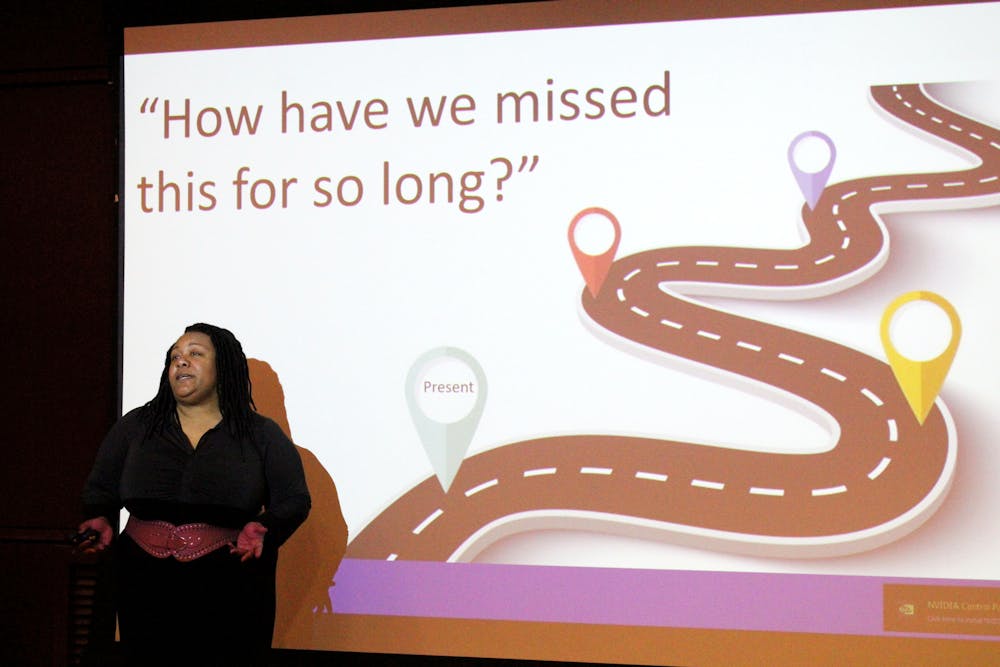Charis Tucker said she will always remember every trip and vacation she’s ever been on. The creator and host of the study abroad podcast, STAMPED, considers herself a Black traveler and explorer. But when she learned that other Black and African American individuals weren’t exposed to the same experiences, she knew there was a part of history that needed to be addressed.
“There's these gaping holes and things that we don't know about the early experiences of Black travelers from a leisure perspective,” Tucker said. “There's a lot that starts kind of right after the civil rights movement, but Black traveling was long before that and we don't really know a lot about that Jim Crow era.”
Tucker, a Ph.D student at Virginia Tech University’s Howard Feiertag Department of Hospitality and Tourism Management, shared her findings about the history of Black travel with Elon University on Feb. 8. Her research focuses on race and tourism, which led her to understanding the history of Black travel and its present movement.
Tucker presented on the different ways Black and African American individuals are portrayed in travel media throughout historical and present times, finding that there’s unequal coverage. She also discussed the Green Book, an annual guidebook for Black and African American travelers published between 1937 and 1967. The book served as a resource for Black and African American travelers, providing notes and tips to keep them from running into difficulties during their trips.
Tucker said it’s important to understand this history and see its effect on Black and African American travel today.
“I think the more we can dig into the history, we can see how these things are passed down from generation to generation, and how they tend to evolve,” Tucker said.
Her podcast, STAMPED, invites Black and African American students and industry professionals to share their lived travel experiences and understand the past as well.
Celebrating Black History Month at Elon
The presentation, “Resistance and Resilience: Black Travel Past & Present,” was hosted by Elon University’s Global Education Center as part of the series of events celebrating Black History Month. Maia Stewart, program coordinator for the GEC, said she met Tucker at a diversity-abroad conference in October 2022 and was interested in her experience with international education and global programming. Tucker’s knowledge on the history of Black travel is what encouraged the GEC to invite her to speak on campus.
This year’s Black History Month theme at Elon is “The Black Renaissance: Revive, Reclaim, Rejoice,” highlighting the intellectual and cultural revival of African American music, dance, art and culture. Stewart said that this year’s theme is much needed.
“I think in light of recent events, it's very easy to get bogged down and become kind of numb. I think having a theme like this gets people to look forward to something,” Stewart said. “We still have to live as Black people. People of color still have to live, they still have to rejoice, they still have to live their life taking care of themselves.”
Sharing Global Experiences
In order to understand more about abroad experiences, the GEC will host two workshop sessions called Picking Up the Missing Pieces: Reflections on Re-Entry after Study Abroad on Feb. 13 and 14 to give students a chance to engage with each other about their study abroad experiences. The purpose of each workshop is to understand personal lived experiences abroad to then create resources and implement future strategies for global education.
These workshops are also part of the GEC’s Diversity, Equity and Inclusion Strategic Plan — a 52-goal plan of action created to serve Elon students and their global studies from a DEI standpoint.
“DEI should be at the forefront of every conversation because it's going to affect people, no matter what, it's just going to affect you,” Stewart said. “That's just how it is, right? It's going to affect me differently than it might affect some other people, but it's going to affect people.”
Students like senior Jaelan Price who returned from studying abroad said that it’s important to share lived experiences, especially for Black or African American students. Price studied in Sevilla, Spain her junior year and faced some difficulties as a minority abroad.
“Study abroad in general is hard,” Price said. “You can either feel very alone or isolated, and then to stack that with having identity differences and not being able to possibly make those friendships and find that community amongst other students who are studying abroad, makes it extremely hard.”
Though the study abroad experience is different for everyone, Tucker said traveling and living in a new area is worth the learning experience.
“My first time abroad really opened my eyes to what life's experiences were for not just Black people, but individuals in general, and in different countries that I don't think you can necessarily glean from a classroom,” Tucker said. “You're able to really visibly see the inner workings of what it means to be a globalist society.”


